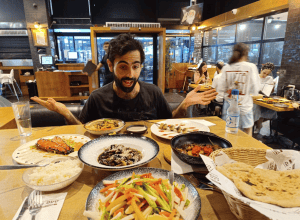By: Yuli (Yoel) Edelstein
The answer to “Who is a Jew?” is of course dependent on place, time and circumstance. Certainly, the concept has no conclusive definition, which is evident in the plethora of highly charged arguments and articles published on a variety of platforms. As long as we are not discussing a concrete legal question, I don’t believe the many meanings to be invalid and that we must seek a single, hermetic definition; the many streams and opinions are part of our DNA, and a single, definitive answer could – heaven forbid – signify the end of the Jewish people. Never fear: it is early to eulogize us or our divided culture just as the long-standing jest “find two Jews, you’ll get three opinions” reflects a familiar reality.
Since the appearance of the idea in the Bible, primarily in the Scroll of Esther (“Now in Shushan the palace there was a certain Jew … And many of the people of the land became Jews”), the definition has served generations to differentiate the individual, a member of the Jewish people or Jewish community, from those around them, in the cultural, national or religious context. It appears in Kings in the context of language: “Speak, I pray thee, to thy servants in the Syrian language, for we understand it; and talk not with us in the Jews’ language” (Kings II, 18:26), while the story in the scroll serves – by elimination – to define the persecuted people by describing the enemy as the “enemy of the Jews”.
As the definition becomes more fundamentally rigid and demanding, reality demands that it become simpler and adjust itself to the passage of time. In the modern era, the question of Jewish identity is reflected in endless diversity in the Israeli public space in light of the fact that Israel has undertaken to be a home for every Jew.
For me, this is more than theoretical: In my youth, I lived under a totalitarian regime that forbade any expression of Judaism, and I paid a heavy price for my Jewishness. On the other hand, I immigrated to Israel as a Jew without parents under that same unique law that begins with the words “Every Jew has the right to come to this country.” As with any hazy wording, it left fertile ground for interpretation and wrangling over ideological differences. I became familiar with the dilemma beside a Prisoner of Zion who fought alongside me to leave the Soviet Union and also paid a heavy price. Although his last name is Jewish, his mother was not Jewish. Is such a person “Jewish?” That, of course, depends on context and perspective.
The argument is echoed in rulings by Supreme Court justices who heard petitions on the matter and reflect differences of ethical opinion: “The term ‘Jewish’ according to modern ideas is both national and religious, and they cannot be separated,” wrote Justice Yitzhak Kister – who has an ultra-Orthodox background –in the 1970 Shalit case (as the result of which the Law of Return was also applied to those who converted), while Justice Berinson stated that the concept of nationality, which most people consider separate from religion, cannot be infused with the tests of Jewish law. The complexity was evident even earlier in the Supreme Court ruling in the case of Shmuel Oswald Rufeisen (known as Brother Daniel), a Polish Jew and Holocaust survivor who converted to Christianity and sought to immigrate to Israel under the Law of Return.
The justices deliberated but rejected the petition. Surely our Jewishness is important enough to temper its definition; it is therefore not enough, with the best of intentions, for those who are “Jewish at heart” to join this people.
The concept “Jew” is therefore charged with multi-faceted significance and carries Jewish history on its shoulders: the persecutions, the pogroms, indiscriminate antiSemitism toward anyone with a Jewish name; but it also includes the age-old traditions, the ancient language, the wealth of art and the ancient grace of this land.
In grappling with Judaism as essence in this age, it is important to recognize the new challenges facing the Jewish people in Israel and abroad. Assimilation is skyrocketing at a terrifying pace, to the extent of real concern for the continuation of the next generation in the Diaspora, while here, inside Israel’s modest borders, we are dealing with dominant “minorities” and the need to maintain Israel’s Jewish population alongside its Jewish and democratic character.
In my eyes, with all due openness and tolerance, I doubt whether a person can be a complete Jew without living in Israel (while still a good and beloved Jew!). We must be in tune with the various voices and streams and include them as much as possible in the broader definition of Jewishness.
In light of the challenges facing us, in a reality in which many Jews are “seed of Israel” whose halakhic Jewish identity has become forcibly blurred, we must seek the conversion of anyone who satisfies the criteria and bring them under the wing of Judaism in our lifetime. I hope that there are people who will take upon themselves this heavy responsibility for the fate of the Jewish people.
Yuli Edelstein is the Knesset Speaker.









